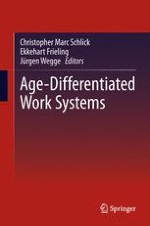2013 | OriginalPaper | Buchkapitel
Age Differences in Motivation and Stress at Work
verfasst von : Guido Hertel, Markus Thielgen, Cornelia Rauschenbach, Anna Grube, Christian Stamov-Roßnagel, Stefan Krumm
Erschienen in: Age-Differentiated Work Systems
Verlag: Springer Berlin Heidelberg
Aktivieren Sie unsere intelligente Suche, um passende Fachinhalte oder Patente zu finden.
Wählen Sie Textabschnitte aus um mit Künstlicher Intelligenz passenden Patente zu finden. powered by
Markieren Sie Textabschnitte, um KI-gestützt weitere passende Inhalte zu finden. powered by
